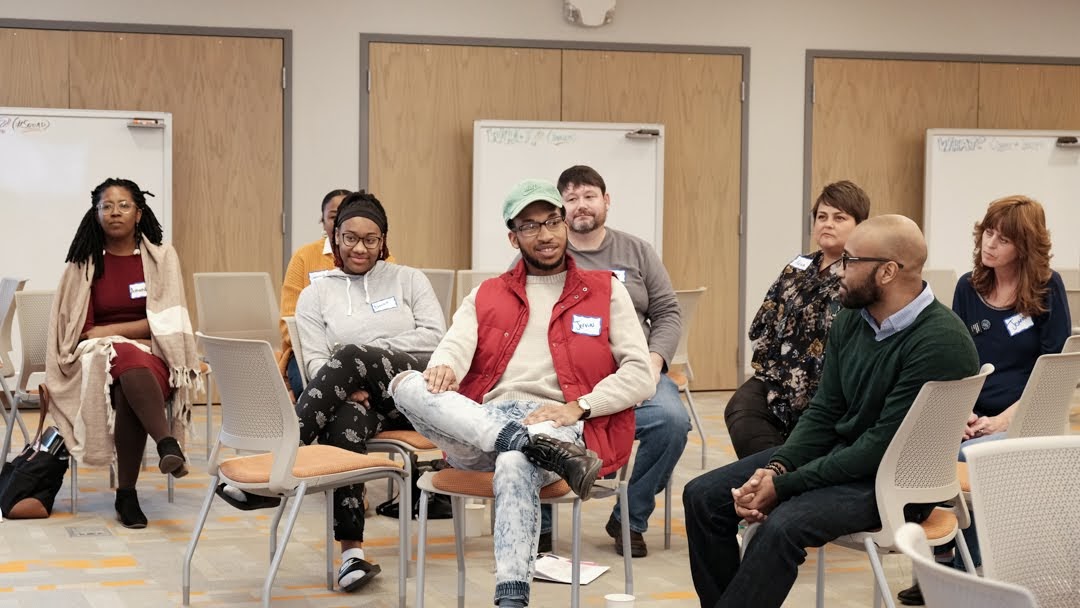
Centering Children in Politics symposium in St Louis Myrina Otey / TJS Photography
Click here to read Jonathan's recent op-ed in the St. Louis American regarding potential school closures and how children are suffering.
What’s politics without the voice of young people? Irresponsible. Our future leaders must be in the hearts of any decision maker, influencer, or everyday human bring when engaging in the political process. This mentality is that of the organizing behind our partners Deaconess Foundation and Faith for Justice, who hosted a recent “Centering Children in Politics” event in St. Louis.
This spirit is also what drives AFSC St. Louis, the Freedom Arts & Education Center (FAEC), and Good Journey organizations whose youth showed out at this gathering. It’s imperative that we have more sessions that embody this understanding around providing young people with a platform to express themselves and their issues. AFSC St. Louis continues to be proud of our youth and appreciative of advocates that stand with them.
AFSC St. Louis is tickled by any notion that progress can be made without any accountability to our future leaders. The crooked idea that youth do not know what’s best for themselves is paternal and unhealthy. Great social change movements from history remind us of the courage, passion, and wisdom of our babies.
Youth showed this at Kelly Ingram Park in 1963 Birmingham, Alabama, when they fought for freedom despite facing jail, fire hoses, and police dogs. Years later in 2014 Ferguson, Missouri, youth resisted for justice while being met with tanks and pepper spray. Any movement that does not support youth at the table, on the panel, in their schools, on the streets, and in their everyday lives is ahistorical and reckless.
There must be adults who are not afraid to lift up our young people. They exist—such as those with Deaconess Foundation and Faith For Justice as expressed in this “Centering Children in Politics” symposium. There’s often this myth that youth have nothing to lose when discussing issues of employment, housing, education, health, media, budget, and safety. Some say youth are too young to have a stake when the reality is that their wellbeing is what’s at stake.
Two of the events at the symposium featured dynamic speakers, Hílda Davis and Zellie Imani, who spoke to youth. Davis, in conversation with Afrofuturism, elaborated cultural and political ideas that impact youth. Imani, speaking as an organizer, talked about how young people have shaped national discourse. The mindset of the event hosts and speakers were in sync: we must look to young people. They did so unapologetically.
Organizations that work directly with young people year-round must continue their work and follow the leadership of their constituents. Since the lives of youth do not stop at the end of the academic calendar, creative means of engaging young people must be at the forefront. The triple threat of AFSC St. Louis, FAEC, and Good Journey speak to what power can come from this practice.
During the symposium break-out session, FAEC youth leaders led a drum circle that emphasized unity. Afterwards, FAEC, AFSC St. Louis, and Good Journey youth discussed their vision of what a future with youth at the center could be and tackled institutional racism.
Afterwards, youth representatives candidly talked on a panel before a room full of listening adults about their challenges, dreams, and passions. The will of groups that work with young people must match the will of the humans they care for.
AFSC St. Louis is deeply grateful for the host in being invited to the event and enthused after connecting with the other youth groups. This effort was the first step in a longer journey toward organizing around politics with responsibility.
For more information about AFSC’s work in St. Louis, please contact Jonathan Pulphus at JPulphus@afsc.org.